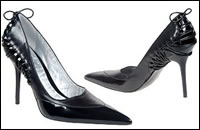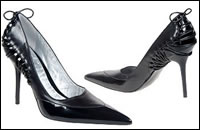Breached Fashion Contracts

 |
| A pair of new shoes on display |
While cleaning her shoes in readiness for her first date, she noticed that the beautifully affixed beads on her shoes were of different color and design.
Her case may look isolated but it happens to us every now and then. Whenever we shop for clothing items, the excitement that grips us is so unique that we get caught up in the choice-mix ending up with unexpected options. We end up blaming fashion trends and fads for our impulsive purchases. We are accustomed to a visual-oriented society where personalities are judged on the type of dress they wear, how much it costs, who else has it and where is it sold. While it is prudent to warrant instant buys due to unrelentingly beautiful display of items by stores, it is necessary for us to govern our spending habits.
Those who buy clothes because they have the money will confess to you they have wardrobes full of items they can't wear. Some may have bought the item because they thought it could match their standards only to walk downtown and find every ordinary citizen wearing the same item. The buyer end up regretting why they bought the item in the first place. The losses in monetary terms and personality disorientation is another big blow.
It is advisable to take an inventory of what you already have in your wardrobe before new purchase. This will guide you to buy only what you need. If you have outgrown your favourite dress, or the dress has outgrown you; the likelihood of finding the same in the store is minimal. It is good for you to buy another with features that excite you in the previous item. If it is an accessory to complement a dress top, wear the item to the store or carry it instead to facilitate easier matching and perfect choice.
Taking friends with us for shopping has never been the best idea. Although sometimes they may contribute to making good choices of dress, more often that not they will choose for you an item that impresses them and not you.
Agatha's troubles could be solved by handling every purchase as a contract. A contract between the buyer and the bought item. The item has been paid for to serve a given purpose. If it does not meet the purpose, the buyer has the right to blame the item. At the same time, the item will blame the buyer for making a wrong choice. Eventually, the buyer not only looses his/her money but the time spent purchasing the item and reputation too, if they bought some ridiculous item.
If a pair of shoes does not meet your standards, why should you buy it? It is equivalent to signing contracts whose fine print one is not conversant with.
